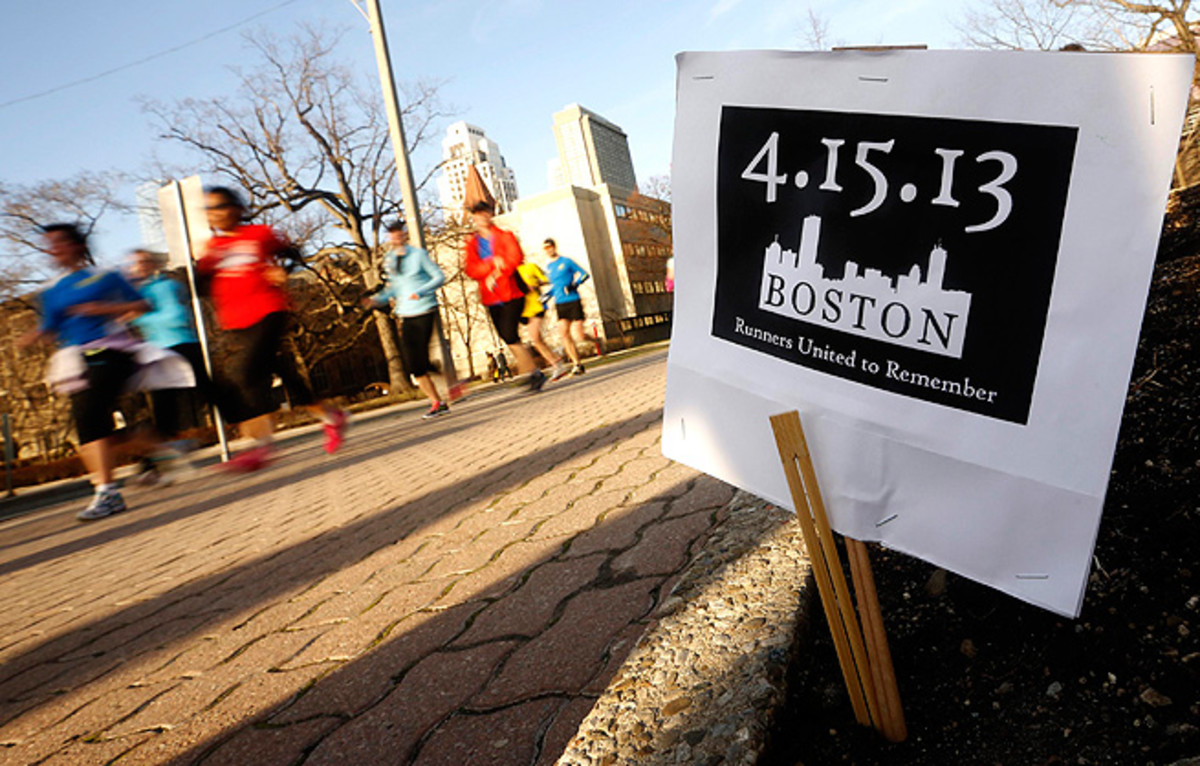Runners unite with sense of purpose, defiance after Boston bombings
Bob Babbit, the co-founder of Competitor Magazine and a man whose grinning mug would appear on a Mount Rushmore of endurance sports, isn't smiling this week. He's sad, pissed and resolute after bombs exploded near the finish line of the famed Boston Marathon.
"People didn't stop going to the movies" after a deranged man took the lives of a dozen people in a Colorado theater in July 2012, said Babbit. "We're going to keep running. And riding. I mean, this isn't just a hobby. This is who we are. This is our tribe. This is what we do. No one's gonna take that away from us."
Doug Thurston agrees. He spent 45 minutes on Monday milling around the finish line in Boston, two hundred feet from where the first bomb would soon go off. As the director of the Big Sur Marathon, he was "observing" the top-shelf operations of the world's oldest annual marathon. He was also waiting for a friend who'd started with the "third wave" of runners, and came across the line in 3 hours, 58 minutes. She'd collected her medal, and a "heat wrap" that helps ward off post-race hypothermia. They were two blocks away from the finish line when they heard the first explosion.
A day after the attack, Thurston spoke with barely concealed awe of race officials, police and first responders, whose cool professionalism saved lives.
"They were phenomenal."
The Big Sur Marathon takes place on April 28th; starting in Big Sur, runners will chug over rolling hills, past redwoods and over dramatic gorges. Other than distance, it has little in common with its bigger, older brother in Boston -- which would seem to make it a less likely target. Still, Thurston said, "We, like all races, will be reviewing our public safety plan, in light of information ... from Boston."
Monday's attack, he speculated, was more about striking a blow against something broad and generalized, "in the spotlight of the international media," than "a comment on marathoners," as he put it.
I agree. What have marathoners ever done to anyone, other than bore people at cocktail parties with lengthy accounts of their target splits, heart rate monitors and anti-chafing unguents?
While the coward(s) behind the bombings may not have borne a grudge specifically against distance runners, they've succeeded in galvanizing this stubborn tribe, uniting them as never before. Not only will the show go on, in the wake of Monday's attack, but it will go on with a heightened sense of defiance, solidarity and purpose.
Early Wednesday morning, a Los Angeles running club called the LA Speed Project staged an impromptu marathon, starting and ending at the Santa Monica Pier. (Who among us hasn't run 26.2 miles on less than a day's notice?) Runners in Saturday's Salt Lake City Marathon will run in green. All 6,000 runners at the Loskop Marathon, held in the Mpumalanga province of northeastern South Africa, will be given black ribbons, to honor their fallen comrades in Boston. In a startling example of the lion laying down with the lamb, a recording of Sweet Caroline -- a Fenway tradition! -- was played during the third inning at Yankee Stadium on Tuesday night.
A pair of Boston College students organized The Last 5, inviting people to walk from Chestnut Hill to Copley Plaza on Friday afternoon, "for anyone who did not get to finish," and to make the point that "we decide when our marathon ends." Correction: they decide, with an assist from the Boston Police Department. When the event caught fire on social media -- some 15,000 people indicated they would join the walk -- the already overtaxed BPD asked them to reschedule.
If a terrorist intended to sow fear and doubt, to cow people and force them to quit, he or she chose the wrong event, and the wrong sport, to target. The running community in general, the Boston Marathon in particular, "was the wrong place to try to find weakness in American culture," says Scott Dickey, CEO of the Competitor Group, which owns the 32-event Rock 'n' Roll Marathon series. "I mean, these people qualified to compete in Boston. These are some of the grittiest, toughest people around.
"Think about the word 'endurance.' It means resilience -- your ability to withstand and recover from trauma. That's what this is going to end up being about. What we're going to see here is an incredible rally from the running community."
I spoke with Dickey shortly before he got on a conference call with various federal, state and local law enforcement agencies to discuss Rock 'n' Roll's upcoming St. Jude Country Music Marathon, to be held on April 27th in Nashille.
"We've got 30,000 people" registered, he said, "so we're going to talk about enhanced security measures, and how we take the safety of our runners and spectators to the next level."
What happened in Boston "makes me feel the way I felt after Munich," says Babbit, referring to the killing of 11 Israeli athletes at the 1972 Summer Olympics. Both acts make the mind reel. Who would desecrate the Olympics? Who would murder innocents at the Boston Marathon -- "the high church of running," as Babbit says.
Babbit is also a co-founder of the Challenged Athletes Foundation, which in its 18 years has raised more than $40 million to provide "adaptive equipment" -- specialized prosthetics and wheelchairs -- for people with physical disabilities, so they can "pursue active lifestyles," or, as Babbit puts it, "get back into sport as soon as possible."
Don't be surprised, a year from now, to see one or more of Monday's victims taking the start at Boston, with an assist from the CAF, having concluded that they will be the one to decide when their marathon ends.






